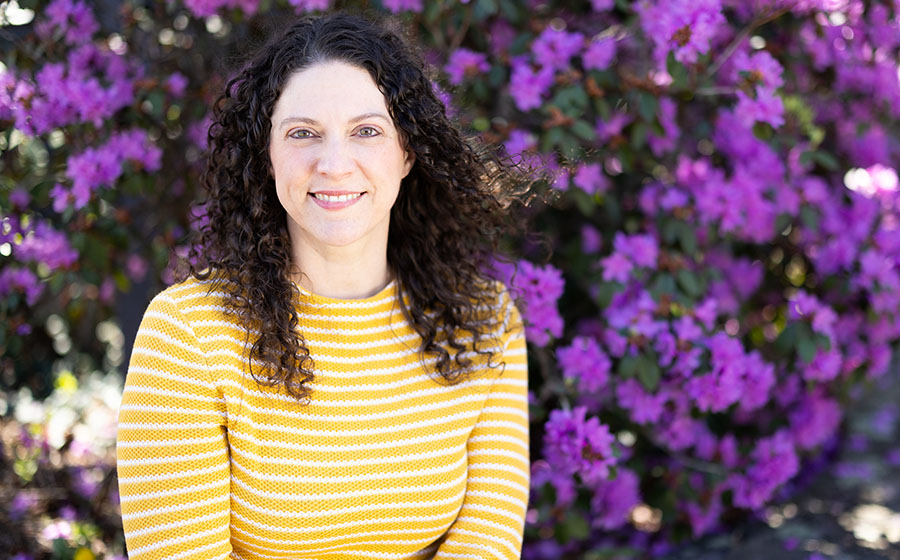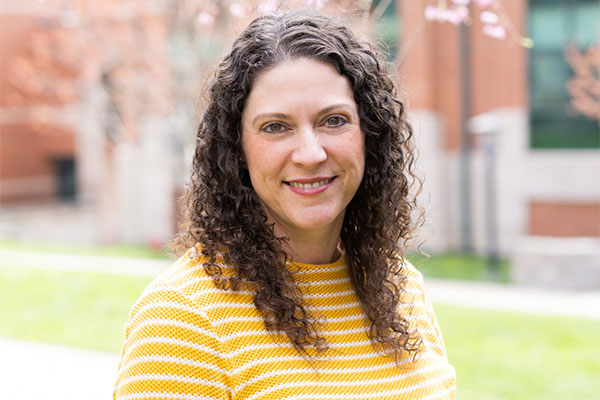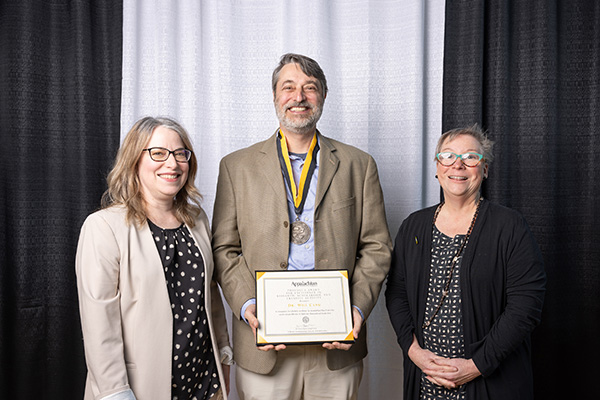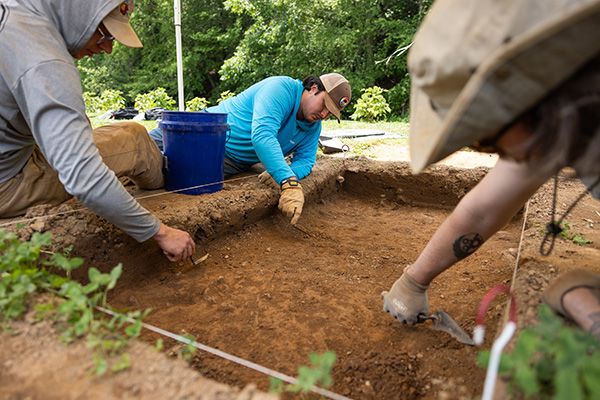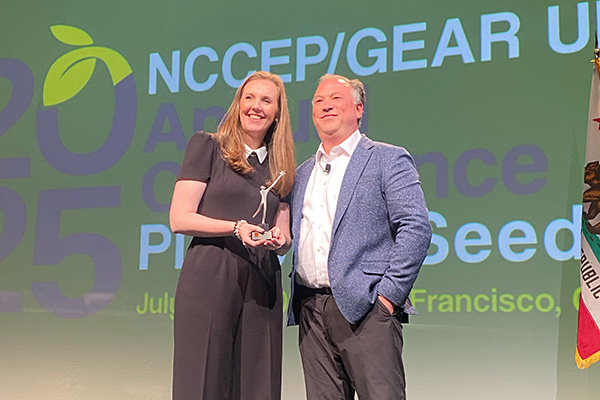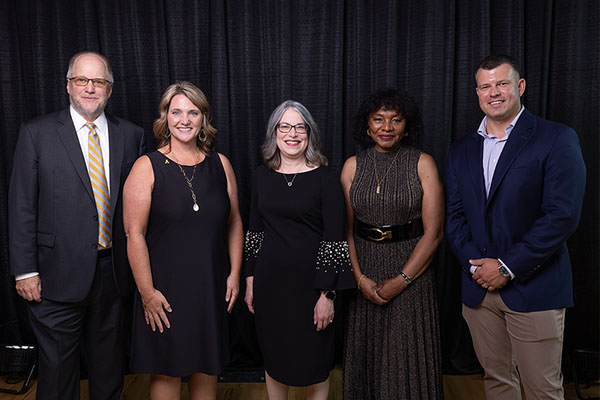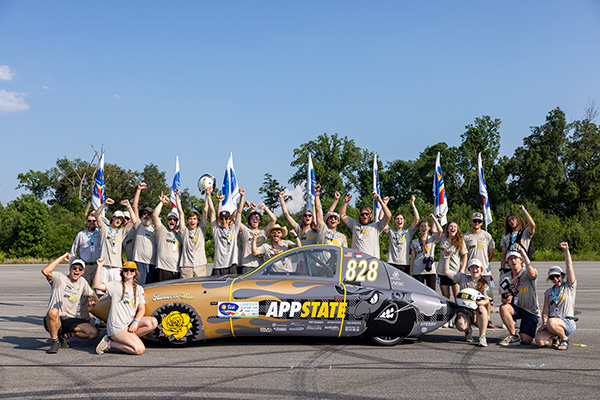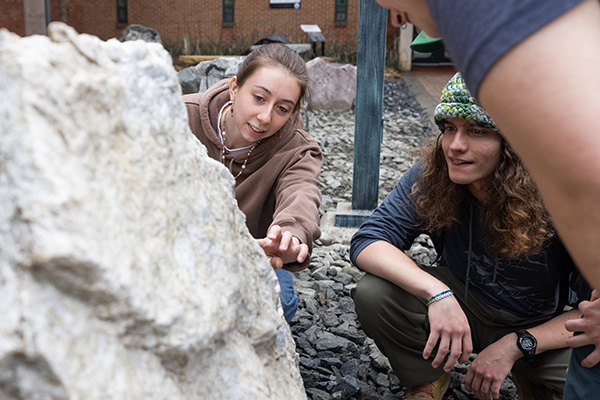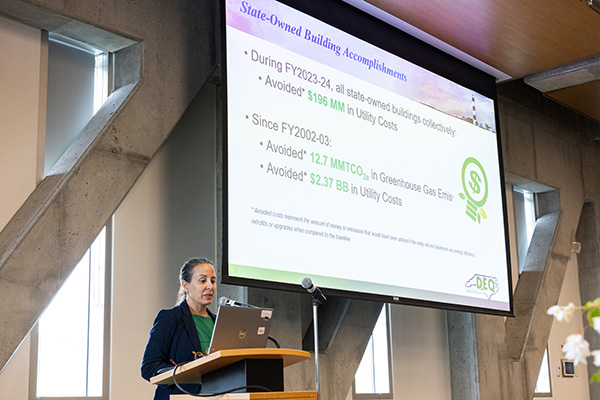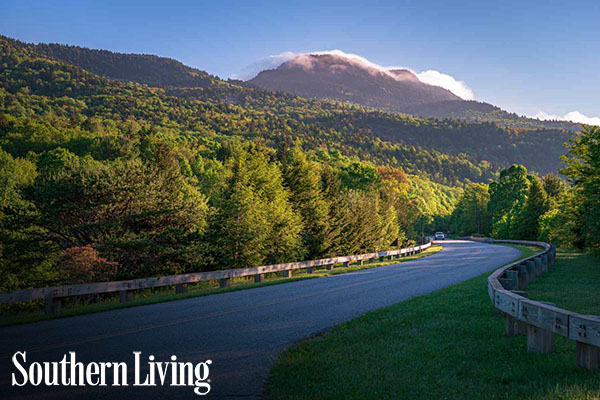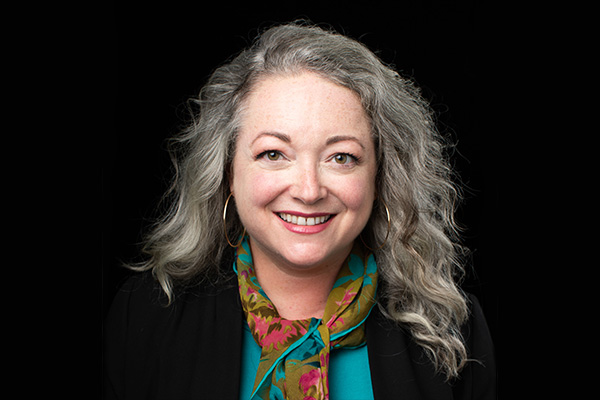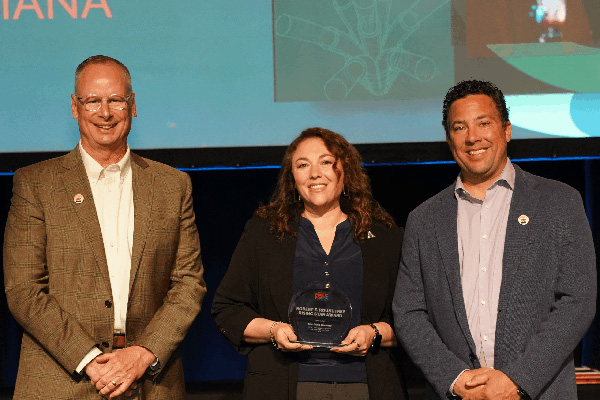BOONE, N.C. — Earlier this year, Appalachian State University’s Dr. Brooke Christian ’05 was honored with a University of North Carolina Board of Governors Excellence in Teaching Award. The award is given annually to one outstanding faculty member from each of the UNC System’s 17 institutions.
Christian is an associate professor and research mentor in the Department of Chemistry and Fermentation Sciences and has been a faculty member at the university since 2015. She is also an alumna of App State’s College of Arts and Sciences, graduating with a bachelor’s degree in chemistry in 2005.
Christian went on to earn her doctorate in biological chemistry at UNC-Chapel Hill in 2010, after which she completed a National Institutes of Health postdoctoral fellowship at Yale University School of Medicine.
At App State, Christian teaches undergraduate and graduate courses in biochemistry and research methods. She also advises chemistry and fermentation sciences majors, and in the 2021–22 academic year, she received App State’s Excellence in Academic Advising Award.
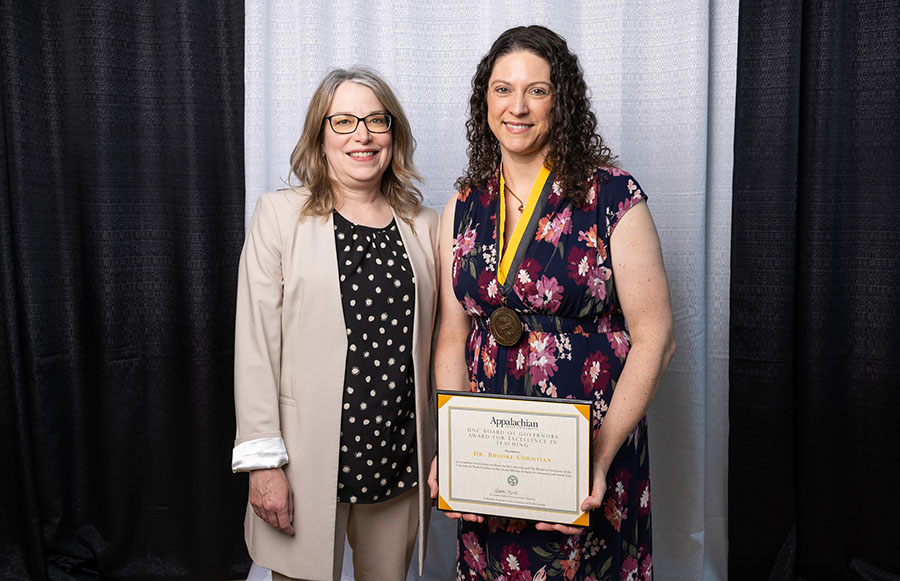
App State Interim Chancellor Heather Norris, left, with Dr. Brooke Christian, associate professor in App State’s Department of Chemistry and Fermentation Sciences, at the university’s 2024 Awards of Distinction ceremony, held April 25 on the Boone campus. Christian is App State’s recipient of the 2024 University of North Carolina Board of Governors Excellence in Teaching Award. Photo by Chase Reynolds
Among her many other accomplishments, Christian has received nearly $550,000 in external grant funding for various research projects, has developed the curriculum for Biochemistry II and Principles of Biochemistry Lecture at App State, has mentored 34 undergraduate students in her research lab, and has given invited research presentations at Winthrop University, North Carolina State University and Jefferson Landing Club.
In this Q&A, Christian talks about her love for teaching and for App State, her passion for chemistry, her research and more.
- Let’s start with the 2024 Excellence in Teaching Award. How did it feel to receive this honor, and what does this award mean to you?
-
I think that teaching is one of the most underappreciated professions, so I was thrilled to receive a recognition. I feel like I’ve worked really hard to try to be a good teacher, so this is very special. There are so many good teachers in our department, and in other departments, that to be recognized among them is such a huge honor.
- What is it about teaching that you love the most?
-
I love the idea that I am playing a small part in the success of our students. We have some really talented students here, and I love to see them move on to do great things. I was at UNC Hospital last spring, and while visiting the hospital’s coffee shop, I ran into two of my former students who are now physicians there. I am so proud of them! Another thing I really like about teaching is the ability to inspire a love of chemistry in my students. Not a lot of folks you talk to love chemistry, but I do! And in the classroom, I can see my excitement rubbing off on my students, which makes me happy.
- What about App State — what makes this a special place to be an educator?
-
I have a long history at App State. I came here as a high school student to do Summer Ventures in Science and Mathematics. My research project was with David Farrar, whose office is right next to mine, and that was super cool. Then I came to App State as a transfer student for undergrad. My brother came here and I have numerous family members who are alumni, so it means a lot to be here. And I love the student population. I think we have a lot of really hard workers, especially many of my students who are paying their own way through college, and I appreciate that. Being able to work with them — I love it.
- What are your goals as a teacher, and what do you want your students to take away from your classes?
-
I think my biggest priority is teaching students to solve problems that they haven’t necessarily thought about in a certain way. So, if I ask them a question, it’s typically a stretch question. I want to teach them to think. Life doesn’t happen in a box. People don’t come to you with questions with easy answers. When you’re a physician, for example, you don’t go to the doctor when you feel fine, you go when something’s wrong. They have to put those puzzle pieces together. I want to train my students to put puzzle pieces together and understand the bigger picture, and that’s hard. Mostly I teach upper-level undergraduates, and so by the time they get to me they’ve had a lot of training in this, but sometimes it’s still hard for them to think in that way.
- What sparked your interest in chemistry?
-
I never had an interest in chemistry as a kid, but I think that is mostly because I didn’t know it existed. My interest started when I got a job with a chemical company in high school. I started that job when I was 15. The guy who ran the company was very inspiring and excited about making new products. He had a great repertoire of chemicals and I got to participate in the development process, and that was very exciting to me. It was right after that that I went to the Summer Ventures I mentioned earlier. I think the combination of those two experiences really helped me come in as a chemistry major as a freshman. That love of chemistry has never gone away.
- When did you know you wanted to become a teacher?
-
I actually didn’t think I would ever teach. When I was in graduate school, I tutored on the side, because that was kind of the best-paying job you could have at the time. I realized that tutoring came pretty naturally to me, because I was never that student who things came easily for. I always had to work really hard to understand what the teacher was saying. Because I had to break everything down to such a simple level for me to understand, I was able to do that for other people. That’s when I thought, “Wow, maybe I could teach.”
- What research have you done recently?
-
In my research lab, we are using a protein from tardigrades, or water bears, and they’re very stress resistant. I have a collaborator at UNC-Chapel Hill who figured out that this particular tardigrade protein is able to stabilize other proteins and keep them from losing activity. We kind of stepped in on this project, looking at whether we could stabilize proteins in solution without having to dry them out. Our big, lofty goal is working to stabilize insulin at room temperature so that you wouldn’t need to refrigerate it. That could be life-changing for a lot of people, but research takes a long time, and we chip away at it. We do have some promising results, and my students recently presented those at the American Chemical Society National Conference in New Orleans.
- You’ve also been a research mentor and advisor to students — how have those out-of-classroom experiences been rewarding?
-
I like advising because it can be so impactful for a student. You can help someone graduate early, you can help them complete a double major or prepare them for professional schools. You can really change someone’s trajectory by helping them with options they didn’t know existed. In terms of advising my research students, that is one of the most rewarding things that I do here. My research students are here because they want to be, and they are so bright and so motivated. They keep me on my toes. They have been so successful that it makes me feel proud of how much they develop when they do undergraduate research.
- Is there anything you would like to add?
-
One of the things that drove me to be a teacher was the impact that my teachers had on me. I think that’s especially meaningful because I am back at the place where my teachers had such an impact on me. My colleagues are the ones who really reinforced to me the value of being a teacher, so it’s cool to be back.
What do you think?
Share your feedback on this story.
Mountaineers were recognized for excellence in leadership, teaching, service and more
About the A.R. Smith Department of Chemistry and Fermentation Sciences
The A.R. Smith Department of Chemistry and Fermentation Sciences offers a Bachelor of Arts in chemistry, a Bachelor of Science in chemistry with eight different concentrations and an interdisciplinary Bachelor of Science degree in fermentation sciences. The department’s programs prepare students to attend graduate and professional schools, as well as for employment in the pharmaceutical and fermentation industries and other business sectors. Learn more at https://dcfs.appstate.edu.
About the College of Arts and Sciences
The College of Arts and Sciences (CAS) at Appalachian State University is home to 17 academic departments, two centers and one residential college. These units span the humanities and the social, mathematical and natural sciences. CAS aims to develop a distinctive identity built upon our university's strengths, traditions and locations. The college’s values lie not only in service to the university and local community, but through inspiring, training, educating and sustaining the development of its students as global citizens. More than 6,800 student majors are enrolled in the college. As the college is also largely responsible for implementing App State’s general education curriculum, it is heavily involved in the education of all students at the university, including those pursuing majors in other colleges. Learn more at https://cas.appstate.edu.
About Appalachian State University
As a premier public institution, Appalachian State University prepares students to lead purposeful lives. App State is one of 17 campuses in the University of North Carolina System, with a national reputation for innovative teaching and opening access to a high-quality, cost-effective education. The university enrolls more than 21,000 students, has a low student-to-faculty ratio and offers more than 150 undergraduate and 80 graduate majors at its Boone and Hickory campuses and through App State Online. Learn more at https://www.appstate.edu.
